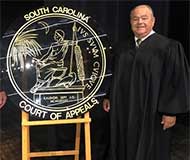8/21/2020
South Carolina Appellate Court Declares Unzipped Pants SuspiciousAn open fly during a traffic stop is an invitation to a search, the South Carolina Court of Appeals ruled.

A motorist with an open fly is inviting South Carolina traffic police to conduct a search, the state Court of Appeals recently ruled. On August 14, 2013, Cheryl Jones drove to the bus station in North Charleston to pick up her common law husband Michael N. Frasier Jr. After the couple pulled away, Sergeant Daniel Pritchard ordered them to stop, claiming the car's third brake light was out.
What really happened was that the city police officers had been staking out the bus station, and the officers assumed that those taking mass transit were up to no good. The sergeant noted that Frasier "looked left, cleared right... at the whole parking lot, left and right" before getting into the car driven by Jones. Looking around a parking lot was suspicious.
During the stop, the sergeant noticed the zipper on Jones's pants was down. She explained to him that she was in a hurry and had jumped out of the shower before driving to the bus station. It was 80 degrees that morning, headed to a high of 95 with 79 percent humidity, and Officer Steve Hall noted that Frasier was sweating, which suggested he was nervous.
"My interest was piqued highly that something was amiss," Officer Hall testified.
Jones gave permission to search the vehicle and Frasier responded ambiguously when Officer Hall asked, "Do you mind if I check you out?"
"I do, but..." Frasier said.
Because Frasier turned around, the officer searched him and found cocaine. The question put before the three-judge appellate panel was whether the officers had any legitimate reason to extend the traffic stop for a purpose that went beyond investigating the broken third brake light infraction.
"Because we must evaluate the trial court's findings for clear error, we reluctantly conclude evidence supported the trial court's finding the officer had reasonable suspicion to extend the stop," Judge James E. Lockemy wrote for the court. "Although we acknowledge that several of these factors would likely be insufficient standing alone to support a finding of reasonable suspicion, they must be viewed under the totality of the circumstances."
The court also found that Frasier's failure to object clearly to the search meant it was conducted voluntarily. A copy of the ruling is available in a 250k PDF file at the source link below.


